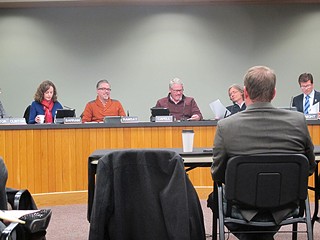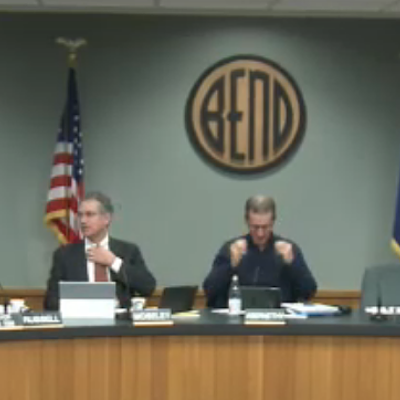Casey Roats' path to City Council reached another milestone Monday evening. After about three hours of often-tense deliberations on the letter and spirit of the City Charter's residency requirements, councilors voted 5-2 to find Roats qualified to serve.
TThe majority aligned in support of the notion that “intent” carries more weight than the common understanding of “to reside.” This argument partially lined up behind Roats’ own intent to maintain legal residency in Bend, but also addressed the intent behind the City Charter’s qualifications requirements.
During the hearing, Councilor Victor Chudowsky delved into the origins of residency requirements, arguing that they are meant to ensure that candidates are familiar with their districts without penalizing them for absences due to business or personal circumstances. He dug deep, and pointed to a documented debate between Founding Fathers James Madison and George Mason, noting that arguments in favor of a less strict requirement appear to have prevailed on both the federal and state level.
The takeaway, Chudowsky argued, is that residency does not require a continuous presence.
“What’s important is the concept,” Chudowsky said. “You don’t want unnecessary restriction that would exclude good people.”
But Mayor Jim Clinton and Councilor Doug Knight did not agree. In their dissenting opinions, they made a case for a stricter view of the Charter's residency requirements and argued that, for a qualified candidate to be considered temporarily absent from his or her "residence," the candidate must have established a permanent residence in the city within the 12 months preceding the election.
In October 2013, Roats sold and moved out of his Bend home on Borden Drive permanently, and did not establish a new permanent residence in the city before Nov. 5—the beginning of the yearlong window.
"I think you are asking the Council to look at the Charter but interpret it rather loosely in terms of what these words 'shall have resided' mean, and you're asking Council to look at the state law which talks about temporary absences," Clinton said. "How can you be temporarily away from a residence you don't have? How can you be a resident of Bend if you don't have a residence?"
Chudowsky countered: Roats did not establish a permanent residence outside the city, and therefore never relinquished his Bend residency.
"He has to be a resident of somewhere," Chudowsky noted. "I think the argument is stronger for him being a Bend resident than a Deschutes County resident."
The back-and-forth over the legal versus common definition of that key word—reside—was highlighted in Roats' response to a question from Knight.
"Is it safe to say you resided with your parents from October 2013 to October 2014?" Knight asked.
"Yes, we did," Roats replied.
Councilor Capell immediately chimed in to clarify Roats' response.
"But 'residing' there is a funny word," Capell noted, referencing the state's definition of legal residency. "You never intended to stay with your parents long term."
In an interview after the decision, Roats, who spoke candidly at the City Council meeting, acknowledged that he probably should have used a different word.
"In hindsight, I would have said I stayed temporarily at my parents' house," Roats told the Source, adding, "You don't establish a residence until you intend to stay there indefinitely."
Roats told the Source that while he expected Council to find him qualified, he was pleasantly surprised by Councilor Sally Russell's vote of support, noting that the two had butted heads during his campaign.
"During the campaign we had some kind of contentious moments," Roats said. "For Sally to set all that aside and make the decision she made spoke volumes to her character...It really pleased me that a big majority of the Council decided I qualified and it was time to move on."
City Council is expected to certify Roats' election at its Dec. 3 meeting. But that may not be the end of the story.
On Monday evening, during the City Council meeting, Deschutes County District Court Judge Roger DeHoog dismissed a case brought by attorney Charlie Ringo challenging Roats' qualifications. Yet, in spite of dismissing the case, Judge DeHoog did not rule out that the challenge could be re-filed, stating that the case was not yet "ripe" for legal action.
"In concluding that there is no issue ripe for decision, I am relying on the fact it is not who decides Mr. Roats's qualifications that has potential to impact the interests of Mr. Fell or Mr. Boozell (the plaintiffs in the case); it is what they ultimately decide," Judge DeHoog wrote in his decision. "If the existing City Council determines that Mr. Roats is qualified, then the concerns otherwise raised in the complaint could be realized."
DeHoog told the Source that while he has not yet ruled on whether the Court has authority over the Council's decision or whether Fell and Boozell have standing, the court did not have jurisdiction to rule on the complaint unless Council found Roats qualified.
Ringo told the Source it's likely he will re-file.
"The City argues that...they have independent authority to govern themselves," Ringo explained. "The problem is, there's many exceptions to that."
Judge DeHoog confirmed that the Court could, hypothetically, find Roats does not meet State elections qualifications and potentially direct the City to take action.
Read the City's full memo (with exhibits) regarding Roats' qualifications here.
Take our poll here to share your perspective on this story.



























